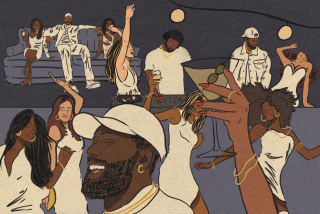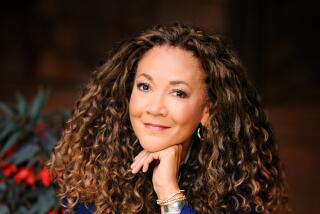Commentary on local issues, viewpoints of residents and community leaders, and letters. : A Voice--and Ear--to the Community : KJLH-FM’s general manager says minorities want information that is relevant to their lives. ‘Our listeners hold us accountable,’ she says.
- Share via
My favorite part of the job is the ability to feel like I’m doing something, giving something back. When I was in corporate America, I got very far from my roots in the African-American community. Now, I really feel like we have an opportunity to accomplish things here at KJLH. I’m sold on the importance of broadcasting.
I feel it’s imperative that minorities own and operate media, so that we can have input. Not necessarily to control the information we receive, but to ensure the information, specifically news, is pertinent and relevant to our audience. Our listeners should have all the facts, both sides of any issue when possible. Specifically as it affects them so that they can make informed decisions. This is not to say that “majority media” doesn’t do an adequate job. But I don’t think they’re as sensitive to minority needs as our listeners want and deserve.
Our listeners hold us accountable, trust me, for everything we do or don’t do. This station has been in the community since 1965. The first owner was John Lamar Hill II and the second is Stevie Wonder. We are very accountable, and we’ve paid a high price for that.
*
When Nelson Mandela was released in 1990, I sent my news director, Carl Nelson, over there to South Africa. And everyone was saying: “Wait a minute. You’re just a little Class A station, with a single station outlet. Why are you doing that?” Because I felt it was important. He went with Jesse Jackson’s contingent and filed two to four reports a day. And it worked out very well. It was very pertinent information. Now we’re covering the new trial of the four Los Angeles police officers charged with violating Rodney King’s civil rights. We’re respected enough, or lucky enough, to get a seat in the courtroom.
Everyone was angry after the King verdicts last year, and some people thought we should have tried to just ignore problems in the city, or hush them up. Well, you can’t do that. As a broadcaster, you have a responsibility not just to play the latest music, but to inform as well. As soon as we went on the air with the verdict, the phones just lit up. Then people started coming down here. They wanted to voice their opinions so we put them on the air. We never got back to the music and we got so many calls from everywhere--London and Australia and Japan. I never knew so many people knew KJLH.
Our morning show, “Front Page,” started in the fall of ’91. Initially, we were trying to find a format to hit some of the harder issues. We were trying to give people more information, or at least throwing the facts out there, and letting people vent their opinions. In the beginning, it was very humorous, with topics like romance, just to get the listeners excited and calling in.
Right now, I hear a lot of callers on “Front Page” predicting the outcome of the new trial of the officers involved in the King beating, and what they’ll do. This time around, we’re definitely going to work a plan as we present information. I want to balance the delivery. Before, I would just let my listeners go on and pretty much say whatever they felt. Not that I would censor them now, but I’d rather make sure both sides of an issue are represented.
There’s an earthiness to the program now that I like. I’d rather it still be live and spontaneous but I want our radio hosts to help listeners say what they really think. Then maybe that’ll help them decide what they want to do. Like, do you really want to say that you hate all white people? Do you really feel that? How do the hosts bring you back to say that, “No, I’m just really upset about what’s happened, and it’s not white folks or black folks, it’s injustice, and how do we deal with the injustice of the system?”
*
I don’t know that there’s a training ground for what I do. Even at the level I achieved at Xerox with financial responsibility, I didn’t really have bottom-line accountability. I didn’t have to do budgets. I came into a business that I had no background in, so I went out and got my MBA at night from Pepperdine. It was difficult, working all day, going to school at night, but it really helped. Now I’m very comfortable with the administrative aspects of the job.
I’m somewhat of a rarity as a black female general manager. Mayor Tom Bradley had a meeting of radio general managers after the riots. So I went. And I looked around, and I was the only black woman in that position in that room. I sat there listening to the guys and the hair started rising on the back of my neck because I thought they were missing the point.
Buildings were burning across the street from my station during the riots. So I couldn’t talk as lightly as they did, with a sense of humor and letting things roll off me. So I spoke my mind. And afterward, I thought, “Oh no. I hope they don’t think I’m just another emotional female.” But yes, I’m passionate. And I don’t feel so bad about it, because I care. So what if I’m not cool and I’m not a member of the old boys’ club? I will never be.
Few of us encounter all aspects of Los Angeles--Hispanic, Asian, whatever. We just go about our lives. We don’t intentionally not integrate but we just do our thing. So we need to know how we all, as responsible adults, feel about things. How better else than in the safe privacy of your home or car, tuning in to a radio station, so you can hear how others feel, and evaluate? As a broadcaster, if I can balance out that information, and encourage listeners to tune in, and understand, and then maybe read more, maybe I can open that window and we can get back to a more open society. So many times we get caught up with the entertainment or informational aspects of the business, many forget it is still just that--a business, with revenues and profit requirements.
If there were one thing I could stress to clients, even more than the agencies that package and place their media buys, it would be financially supporting the communities they do business in. Many sell products and make profits from minorities who purchase their goods, however, they fail to circulate money back into the same communities they take money out of.
Rebuilding our city from the inside out is going to take financial support of the businesses that operate within those communities. If our businesses fail, our communities fail. We must rebuild by rejuvenating our community businesses. I can’t emphasize this enough: It is essential to buy products from black owned and operated businesses. Thus our businesses will have the necessary funds to hire from the community and continue to offer quality products and services.
We are committed to quality broadcasting and service. In turn, we need our listeners and clients to work with us. After all, we’re all in it together.
More to Read
Sign up for Essential California
The most important California stories and recommendations in your inbox every morning.
You may occasionally receive promotional content from the Los Angeles Times.





![Vista, California-Apri 2, 2025-Hours after undergoing dental surgery a 9-year-old girl was found unresponsive in her home, officials are investigating what caused her death. On March 18, Silvanna Moreno was placed under anesthesia for a dental surgery at Dreamtime Dentistry, a dental facility that "strive[s] to be the premier office for sedation dentistry in Vitsa, CA. (Google Maps)](https://ca-times.brightspotcdn.com/dims4/default/07a58b2/2147483647/strip/true/crop/2016x1344+29+0/resize/840x560!/quality/75/?url=https%3A%2F%2Fcalifornia-times-brightspot.s3.amazonaws.com%2F78%2Ffd%2F9bbf9b62489fa209f9c67df2e472%2Fla-me-dreamtime-dentist-01.jpg)







